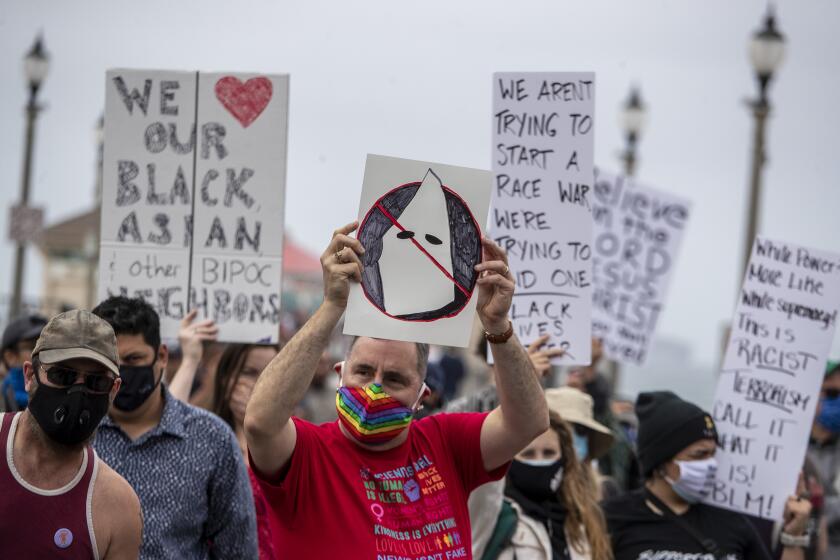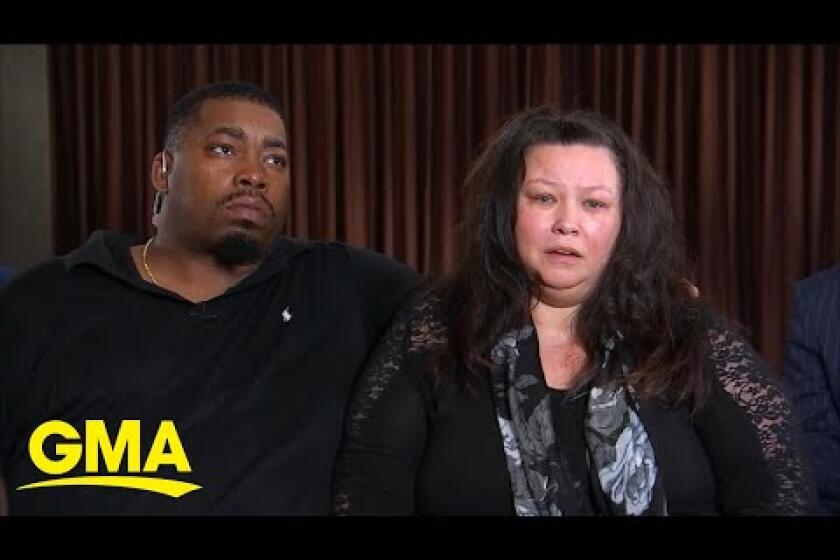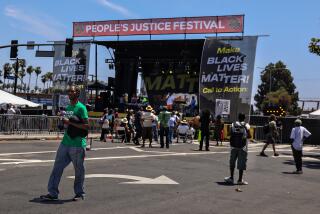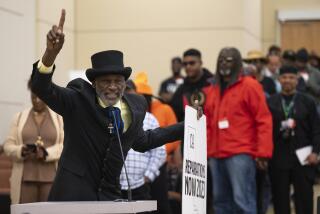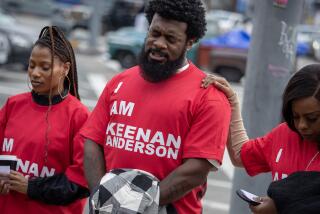Column: There’s a fight over the direction of Black Lives Matter. The timing couldn’t be worse
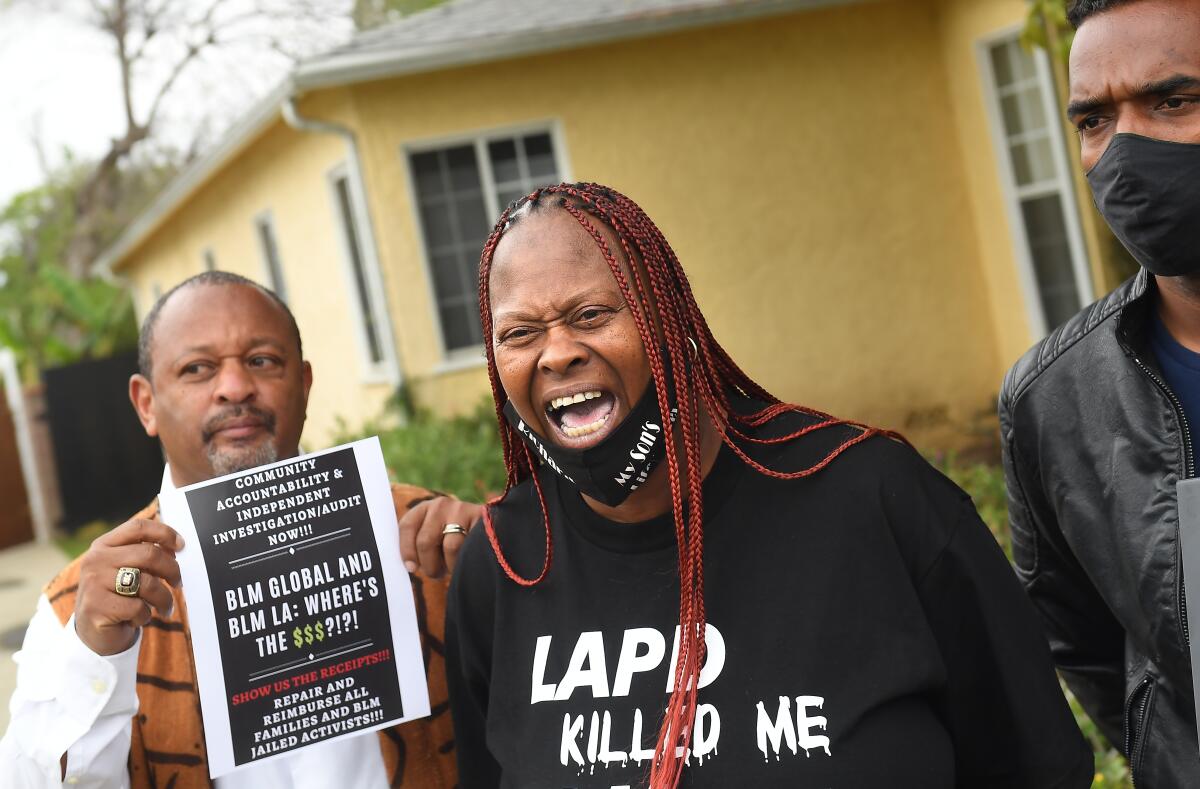
It’s unfortunate and yet somehow also entirely predictable that the airing of Black Lives Matter’s dirty laundry would happen during the trial of former Minneapolis cop Derek Chauvin.
For years, a small group of activists has been asking what the Black Lives Matter Global Network Foundation — founded by Californians Patrisse Cullors, Alicia Garza and Opal Tometi, but now solely run by Cullors — does with the donations it collects to fight racial injustice and police brutality.
And in recent months, those questions have become more pointed.
They started with the searing footage of Chauvin’s knee jammed against George Floyd’s neck, his Black body pinned to the concrete next to a police cruiser. And the protests. And the reckoning. Then the foundation revealed that it had raised more than $90 million last year, a good chunk of it from corporations and celebrities trying to prove their antiracist bona fides after Floyd’s death.
A few families whose relatives were killed by police questioned why they haven’t seen a cent. But it wasn’t until the past few weeks that the questions became public accusations.
“Black lives don’t matter. Your pockets matter,” Lisa Simpson declared to reporters Tuesday, longtime South L.A. activist Najee Ali at her side. “Let’s keep it real.”
Get the latest from Erika D. Smith
Commentary on people, politics and the quest for a more equitable California.
You may occasionally receive promotional content from the Los Angeles Times.
Simpson’s son, Richard Risher, was killed by Los Angeles police in 2016 in Nickerson Gardens. She insists that the local chapter of Black Lives Matter — the first in the country — promised to help pay for the 18-year-old’s funeral, but that she never received any money, even as people told her they had made donations for that very purpose.
However, in a statement issued earlier this month, Black Lives Matter L.A. said it owes Simpson no money and that it operates “primarily as a power-building organization, not a social service organization” that’s equipped to provide financial help to families.
Simpson was undeterred. “Y’all come into our lives and act like y’all got our back and y’all want to say ‘Black Lives Matter,’” she said. “But after we bury our children, we don’t see B, L or M, but y’all out here buying properties.”
That last bit was aimed at Cullors, who has been getting dragged on social media this week over a story in the New York Post about her going on a “million-dollar real estate buying binge” in recent months.
Cullors is executive director of the Black Lives Matter Global Network Foundation, which has several official chapters, including the one in Los Angeles. But there are many unofficial chapters too.
On Tuesday, at about the same time Simpson was talking to reporters, the foundation issued a statement, clarifying that she had received just $120,000 since 2013 and nothing since 2019. Citing its nonprofit status, the foundation said it “cannot and did not commit any organizational resources toward the purchase of personal property by any employee or volunteer. Any insinuation or assertion to the contrary is categorically false.”
Indeed, the story about Cullors buying homes in Topanga Canyon, Inglewood and suburban Atlanta is filled with innuendo rather than outright accusations of grift.
Besides, Cullors has had presumably lucrative book deals and speaking engagements, and has signed a contract with Warner Bros. to produce content for “Black voices who have been historically marginalized.” She didn’t need to illegally tap her foundation’s coffers to buy real estate and I doubt she did.
But the optics of it all are still bad.
I’m no crisis public relations specialist — and I certainly hope Cullors, who declined an interview request, has hired one by now. But it’s clear that, for the sake of the Black Lives Matter movement, there’s a larger conversation that needs to happen about transparency, accountability and expectations.
On Sunday, for example, Tory Johnson, the founder of an unofficial Black Lives Matter chapter in Huntington Beach, said he was shocked that Cullors — again, predictably — had released a statement distancing the foundation from his counterprotest of a “White Lives Matter” rally. The NAACP did the same.
White supremacists failed to turn out big crowds in Huntington Beach and elsewhere but have more coming, say experts on extremist groups.
But I couldn’t help but wince when he told me that at the same time white nationalists were descending on the picturesque Orange County pier, Cullors was hosting a six-hour dance party called “F— White Supremacy, Let’s Get Free,” livestreamed by the Hammer Museum and sponsored by UGG.
“BLM, big corporate monster that they are now, they don’t support me,” Johnson lamented.
This gets to the core problem of transparency. Clearly, the foundation hasn’t moved fast or far enough to explain the importance of corporate sponsorships, how much money it gets from them, where that money goes and who makes those decisions. In a letter last year, 10 BLM chapters — some official, some not — complained about these very issues and demanded more money to operate.
Their complaints are part of what led the foundation to release its “2020 Impact Report” in February. In it were some details about donations and expenses, and a few more about spending priorities for 2021, including reinvesting in Black communities and uplifting Black joy, not just Black death — hence, the dance party.
Una Osili, an associate dean for research and international programs for the Lilly Family School of Philanthropy at Indiana University, said this is the normal trajectory for a grassroots social movement that’s maturing into a formal nonprofit, comparing it to Time’s Up. A sudden uptick in large donations is usually what creates the need for more rules and staff, namely accountants and lawyers.
“This is an organization that’s still growing, still developing its actual structure,” Osili said of Black Lives Matter, adding sympathetically that “it’s hard to really understand how difficult this type of work can be.”
Going forward, the foundation would be wise to release as much information as possible about its finances and governance to the public. Because, at this point, with a small but vocal group of activists calling for an investigation into how the foundation spends its money, full transparency is the only way to bolster trust.
Cullors, in her statement Tuesday, blamed such fears of fraud on “right-wing forces intent on reducing” the influence of the Black Lives Matter movement. And, indeed, racists and other online trolls have reveled in stoking those fears, with hate speech and without evidence — to the point that she deactivated her Twitter account this month.
Katie and Aubrey Wright remember their son as “an amazing, loving kid” in first interview since he was fatally shot by police officer Kim Potter.
But, in some ways, the outlandish accusations being leveled at Cullors are rooted in legitimate questions about accountability to the families of people shot by police. Questions raised by Michael Brown Sr., whose son was killed in Ferguson, Mo., and Samaria Rice, whose son Tamir was killed in Cleveland, among others.
Is it fair that Cullors is making money off of her reputation, built in large part by advocating for justice for slain Black men and women, while Simpson is struggling to make ends meet? Absolutely not.
While it may have been true in the past that Black Lives Matter didn’t have the resources to operate like a social service organization, it clearly does now, thanks to the influx of donations last year. The families of victims should be compensated in some way.
But that doesn’t mean being an activist means one must be poor. Simpson on Tuesday called out Cullors for being a “celebrity activist” who has her “boots in the pedicure bowl” rather than on the ground, marching with other activists.
Why are we demanding that she be in the streets anyway? Wouldn’t her time be better spent influencing public policy in the halls of power so we won’t have another George Floyd or Daunte Wright?
Like it or not, activism is a big business now — and that’s a good thing. Big business means big attention. Cullors along with Garza, Tometi and Melina Abdullah of Black Lives Matter L.A. have worked hard to make sure that Black people have a voice. They built the sort of media and organizational infrastructure necessary to truly amplify the cause of racial justice. And it has worked.
Black Lives Matter is a powerful and sadly relevant movement fueled by the seemingly constant shootings of Black people by police. It’s why so many Americans have donated their time and money, and why the families of those who have been slain have such high expectations of the foundation and its chapters.
That so many corporations, celebrities and random rich people are now down with the cause is something to be celebrated, not denounced. Changing the system doesn’t come cheap or easy, and there’s clearly a lot more work to be done.
This is the kind of political power that Black people have wanted for centuries. Let’s not throw it away over some dirty laundry.
More to Read
Get the latest from Erika D. Smith
Commentary on people, politics and the quest for a more equitable California.
You may occasionally receive promotional content from the Los Angeles Times.
